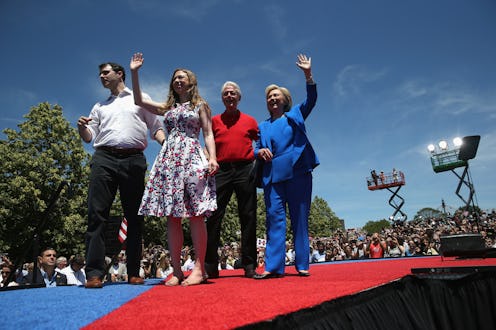A seven-page email memo from Chelsea Clinton, addressed to her parents, has come to light as part of a new batch of Hillary Clinton's emails, released by the State Department on Monday. In the memo, Chelsea Clinton called herself an "invisible soldier" as she shares her takeaways from a four-day trip to Haiti following the 2010 earthquake. The undated memo was addressed to "Mom and Dad" and was sent while Hillary was still Secretary of State. It requested that the information contained with it not be shared or attributed to Clinton without her permission.
Clinton has a great deal of influence, and in a 2010 email, she used it to explain to her parents the urgency of taking action in Haiti. In doing so, she made an extremely important point about international development:
If we do not quickly change the organization, management, accountability and delivery paradigm on the ground, we could quite conceivably confront tens of thousands of children’s deaths by diarrhea, dysentery, typhoid and other water-related diseases in the near future.
"Haitians want to help themselves and want the international community to help them help themselves," Clinton went on to say. "This sounds obvious but wasn't to some of the UN and International NGO (INGO) folks I ran across." In saying this, Clinton draws attention to the often out-of-touch nature of many who work in development. Funneling aid into a country and making overarching demands for political and social change often solves nothing — and might have unintended consequences — unless these actions are accompanied by a willingness to work directly with the people who live in the country to meet their immediate needs.
In her memo, Clinton pointed out that Haitians were asking for tents, soap, latrines, and food, but were not getting that from the aid workers from the United Nations and various international NGOs. She described the various shortcomings of the Haitian government's response to the earthquake and the International NGO landscape, and celebrated the Haitians for organizing themselves and making their needs clear.
She slammed the lack of accountability in the international humanitarian field, and perhaps most importantly, she laid out a detailed plan outlining what she and her parents could do to improve the situation in the region. Clinton urged them to take action, and her voice was heard in a way that Haitians' voices were not. Since 2010, the Clinton Foundation has directed millions of dollars in aid to Haiti, and has pledged to help out with its reconstruction efforts. The results haven't been extraordinary — these sizable contributions haven't provided much relief — but Clinton still made an important impact.
It is clear from the memo that Chelsea's trip to Haiti had a profound impact on her. And it is clear from past occurrences in the American political sphere that Chelsea has a significant influence on her parents' political decisions. It was quite appropriate for her to refer to herself as an "invisible soldier," implying that she was using her influence to passionately fight for something but did not require any of the credit.
The choice of the phrase "invisible soldier" is a poignant one. The Haitians in this context were invisible soldiers in their own right; they worked to organize themselves and make their demands clear, even if those demands often went heard. But Clinton was also invisible — as an ally to the Haitians whom she celebrated and fought for as they worked hard to heal.
